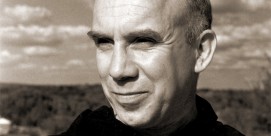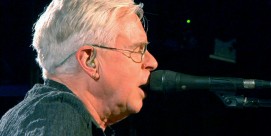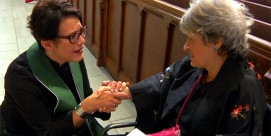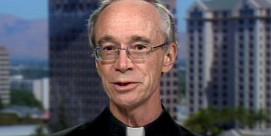In This Episode << SLIDE LEFT TO SEE ADDITIONAL SEGMENTS
Martin Marty Extended Interview
Read excerpts from Bob Abernethy’s interview with Martin Marty:
On describing the central ideas of Protestantism:
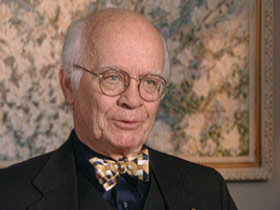
The easiest way to do that is with a little chart: God on top. God comes through Christ, revealed through the scriptures. All Protestants (if they’re Protestants) believe in God. All of them believe God reaches us through Christ. All of them somehow relate to the scriptures. And they believe that God’s basic action to us is undeserved grace. The other Protestant idea is equal standing before God — all members. There’s no pope or hierarchy closer to God than all members. And equal obligation to and privilege to minister, to serve. You have functions, offices, and you give different reasons for following them. But in Protestant belief — equality before God and freedom. All Protestants will say that they experience the grace of God through Christ, and they learn about it in the scripture. They interpret scripture in different ways, but it’s always God’s undeserved grace that makes them equal before God. Clergy and laity are all called to be ministers, [but] all [are] free to be ministers, which means to serve others.
On softening beliefs and the importance of religious experience:
There’s great suspicion of ideology in the modern world. We’ve known fascism, communism, all the other isms. People are also suspicious of dogma, doctrine, stipulated rules. It doesn’t mean they disagree with them. It’s just that they aren’t so moved by them. They’re moved by story. All over the world Protestants are moved by the stories of Jesus — the Good Samaritan, the Prodigal Son. But they don’t only want to hear that 2000 years ago, interesting things happened. They want an experience of it now. And they share with almost all people in the world today that impulse to have experience. If beliefs are less important than experience, it means that no religious leadership can crack the whip and say, “If you don’t believe these things, you’re out.” You can, with a small denomination, do this; you can enforce it. But there’s always another place to go in Protestantism. Experience can’t be checked out so clearly. How do I know the authenticity of your experience? I have to trust you.
On mainline Protestantism:
The mainline is healthy in many tens of thousands of local bases, but it doesn’t have a single national profile any longer. For one thing, it used to get its profile because it was anti-Catholic. It isn’t that anymore; [it] doesn’t have that enemy. So you get into individual local churches — hundred-member churches, thousand-member churches. That’s where the pulse is. That’s where the vitality is. [Mainline Protestantism] suffers from the fact that, as one sociologist said, “You won.” So much of what it stood for became part of the larger culture, whereas if you are a fundamentalist or a conservative Catholic, you really stand apart from the culture.
On rising numbers of evangelicals and Pentecostals:
It hasn’t changed much from 1950, as far as how people identify themselves is concerned: 25% Catholic, 25% mainline Protestant, 8% African American Protestant, 25% evangelical — but it is the evangelical and Black sector (evangelical including Pentecostal, fundamentalist, Southern Baptist and so on) that has surged. In part it’s because they minister so much to the theme of experience. You just don’t have the old stories without your getting it, and then you have to tell somebody else about it. Most in the mainline took for granted that their children would follow them in their faith, and they didn’t.
On loosening denominational ties:
Protestantism was born all over Western Europe, and religion came with your genes and your turf. If you were Scottish, your children would be Scottish Presbyterians. If you were Swedish, your children would be Swedish Lutherans. If you were Dutch, your children would be Dutch Reformed. Today, geography doesn’t mean much; we’re all over the place. And genes don’t mean as much, because there’s a good deal more freedom. Mom and Dad can’t drill it into you. You rebel. You go off to college. You watch television. You meet friends. You go to that mega-book store. You pick up all these ideas. You don’t have inherited loyalties; they have to be won.
On denominational mergers:
Formal mergers are very few. The whole twentieth century talked ecumenism. In American Protestantism you really have only one or two [mergers] — the United Church of Christ, where you went across family lines; the others were the Presbyterians getting their house in order, the Lutherans getting their house in order. So merger is not big. People want to keep the integrity of what they’re about. The key word for most of what’s going on now is “full communion.” [People] would like to be present at the sacred rites of the other fully, equally, and to share ministers and ministries. That’s quite healthy. That’s moving along quite significantly.
On how Protestants choose a church:
Most people start out and the majority ends up in the faith in which they were brought up. They may test it. They may transform it. They may have different ties to it. But if you’re born Baptist, you’re likely to stay Baptist. The biggest change comes about in mixed marriages. If you marry someone from another denomination, normally if you’re both Protestant, you’re going to end up in one of the two. Here a number of things come in: the personality of a pastor; the greeting at the door; the social program (great numbers of Protestants want to serve the homeless); the music; the location, the parking lot. There are a thousand things. But over the long haul the test is, does it speak to my mind and my heart? Is this an authentic experience of God, and does it make sense to me?
On religion and class:
It’s a big marker in American religion, even though every Protestant group is — on paper and in [its] heart — democratic. They would like to include everybody. But somehow people do their own selecting.
On being a Protestant and an American:
Protestantism is the wallpaper in the mental furnishings department in which America lives. When you go back to the founders of the nation, they were reasonable sons of the Enlightenment. But they were all Episcopalian, Presbyterian, Congregational and so on, and that got so stamped in our culture. A century later, when modern industry and capitalism came along, they were all Protestants running the show. It got so fused with the environment that you don’t have to be Protestant to seem Protestant. No matter who comes to America, they take on that style. If I go to Honolulu, I go to a Buddhist church. That’s an oxymoron in Japan. But the Buddhist church has pews, it has an organ, it has envelopes for offerings, it has charity drives, it looks just like the Presbyterians down the block. So you can’t really escape it. Some scholars, like Kwame Anthony Appiah, say people want to be white Protestant; many of the features of the mosque and the Reform and Conservative synagogue take on that color. It’s just part of the life around you. Protestants had a headstart. They’ve been here 400 years. They have had overwhelming numbers through all the history. They only began to share space after three of their four centuries here. And with all that as a headstart, they could bond with the environment; they could shape it. They helped pass its laws, they helped found it in the Constitutional era, they helped give impulse to its businesses. Slaves became Protestant, with their own stamp on churches called Methodist and Baptist. There’s a [Protestant] style that just pervades. Partly it’s competitive. Partly it’s an impulse toward freedom and individuality. But you just cannot tear the two apart. You live there if you’re an American. You would have to begin with the central idea of Protestantism, that is, a gracious God. And that means that God is not going to devastate you. There’s a strong sense that you can be forgiven and start over. Today, Catholics and Protestants sign documents saying they both believe in that; they fought about it five centuries ago. All the religions know they can’t get anywhere just with hellfire and damnation and a punishing God: [it is] grace, grace, grace. We’re a scripted nation. The forefathers and founders of the nation would even read the Bible and say we’re pilgrims, we have Zion, a city on a hill — our presidents still invoke that. That all came from a Protestant reading. Protestants aren’t always faithful to that vision, but it means that others are going to catch it from them, too.
On the Catholic Church crisis:
The biggest impact is going to be on rebuilding trust and on revenge against a hierarchical cover-up of crime. Americans weren’t ready for the secret payoffs, the money, the protection of a system. Most people looking ahead do not expect radical revision of the system, partly because Rome isn’t enthralled about listening to what America wants. But there is going to be a tremendous amount of local adaptation — rebuilding in the parishes and dioceses and, over the long haul, questioning some of the practices, like clerical celibacy. But don’t expect a sudden change on that. Rebuilding trust is the whole [thing.] Most of the criticism is coming from Catholics themselves.
The secular world reports [it.] The Protestant world is not leaping on it; it has its own problems. This is the biggest crisis in Catholicism in centuries. I can’t think of anything that is, in the end, going to have touched more [people.] If you look at a map of all the nations that are now reporting problems, in cultures where reporting is not nearly as efficient as it is in Western Europe and the U.S., you can only say that this has been going on and now it’s been exposed, and it has to be faced by the church around the world. It’s not just an American situation.
On rebuilding trust in the Catholic Church:
You cannot rebuild trust the morning after… I think we will see many portrayals of self-sacrificing, devoted celibate priests. I am from Chicago, where a priest recently gave a part of his liver to a parishioner he didn’t even know, because that’s what Christ would have him do. Those are the stories that we’re going to be watching from now on, because that’s how you rebuild trust. You don’t do it by fiat. You don’t do it by the gaffs that many of the cardinals made in their own statements on television, which suggest that this hadn’t gone deep enough, really, to shake them.
On spirituality:
Thirty and forty years ago most of the intelligentsia predicted that the future of America would be secular, godless. No reference to the transcendent; no magic, mystery, mysticism. A lot of the churches asked, how secular we can get and still be Christian? All of a sudden we find that both the secular world and the already religious world are moving into a whole new understanding. They simply aren’t satisfied by the meanings they get from daily practical life. They think there must be some bigger story. And they have to experience that bigger story that will endow their own joys and sorrows and their own successes and failures with meaning. They are going to find it somewhere. If their own church doesn’t do it, they’re going to find it at a mega-bookstore, at summer retreats or weekend retreats. Of course, the churches have adapted greatly and have gone into much more of an experiential and exuberant approach to worship.
On being spiritual but not religious:
I appreciate the spiritual search of the non-churched, non-synagogued people as being full of imagination, discovery, and satisfaction of the individual. But I once saw a bumpersticker that said: “Spirituality doesn’t make hospice calls.” Spirituality remains, normally, individualistic. You may gather for a retreat, and then you disperse. You may gather at the coffee shop or the bookstore, and then you disperse. The people who are handling the homeless and dealing with addiction and trying to improve senior care and who care about the training of the young — they have to bond together. If they don’t do it in old-fashioned churches, they’ll do it in new-fashioned churches. But I don’t think it adds up to much unless there is some development of community.
On whether religion in the U.S. is holding its own:
American religion can experience earthquakes, but it moves the way glaciers move — you hardly notice it. Sept. 11 was an earthquake. This nation and nobody in it can ever be secure or live with the illusion of security. There are a lot of adjustments that go on and that will show in religion, but they won’t take a single form. Some of the challenges to religion will come from religion, and some from the secular world. The hard-line religions around the world and the hundreds of millions of people in those religions evoke a response among some of our people and leaders who say we have to be just as hard-line. That means a tightening up of the religious groups. The vast majority of religious groups do their adjusting on a different level. In the world that we call secular and material, most of them adapt. Once upon a time evangelicalism was “the religion of the disinherited,” said H Richard Niebuhr. Today, if you want to find evangelicalism, I’ll show you the parking lot of a Dallas church lot full of Jaguars and Lexuses. Christian rock is a billion-dollar-a-year business. The promotion of it is as secular as anything, but they give religious meaning to it. {Religion] is not going to easily move past the strong sense of individual adaptation, individual spirituality, and the non-churched. The leaders of church and synagogue will have much more challenge from the spiritual reform community than they will from the secular [community]. Somehow or other, people adapt. You can take any survey you want. Religious people in America aren’t worried about science; they are not worried about all these things that everybody thought would do them in. They are adventurers on their own, explorers on their own, and [they] are often losing the sense of community. That’s going to be the challenge for religious leadership, lay and clerical, today and tomorrow.
On the future of religion in America:
We’ve been measuring religion from the 1780s to the 1990s, and there always was an upswing in people’s assessment of how religious they are and what they’re about. It will go up one year and down one year, but it’s always been on the upswing. You can hardly go higher than we are now, though. It’s so bonded with American life that I think it’s going to stay there. Even the religiously disaffected and alienated pick up something that looks a lot like religion. This is still a nation where it’s very hard to be utterly removed from religion or utterly opposed to it. But there’s very little instinctive response to particular forms of it, as there was a century ago. We should be watching the glacier carve a slightly different landscape all the time. It will keep moving. There will be changes. There might be global warming, if you will, that heats up religion. There might be new ice ages that freeze it a little bit. But that motion on the larger landscape is very constant.
On the future of Protestantism:
Protestantism with a capital “P” has no constituency at all. There are almost no organizations in the phone book that are called “Protestant.” There are very few ways you can offend someone by calling them “Protestant.” You have mainline Protestants, you have evangelicals, and they may have a somewhat different fate. They are going to keep holding their own in the population. The huge Hispanic move keeping Catholic numbers high has a big spill-off into Pentecostal and Baptist Protestantism, too. So it tends to hold its own there. But it doesn’t have the power to rally. There is no banner that people are going to come and fight for. They’re going to put a distinctive spin on it. Don’t make a fundamentalist mad; don’t insult Pentecostalism. But how do you insult Protestantism as such? That would be very hard to do. That means, therefore, it is going to need stealth campaigns; it is going to make its way without your realizing it is going to make its way.
On mainline growth:
Mainline Protestants, from 1950 when they ran the show to 2000 when they no longer ran the show, have made most of the adjustments they’re going to make. They have more search for authority, tradition; a stronger sense of building identity; a readiness for experience. But their drastic shift was less trust of what the denomination will say without your leaving the denomination and more impulse on what the body of people near you are doing. That’s where its strength is going to be. The same percentage of people are going to identify with it. Its future will depend on how effectively it can rally those people who say they are open to being rallied. Whenever reckoning about the Protestant future, we have to pay attention to that multi-million membership in the Protestant churches that is African American, Methodist, Baptist, Pentecostal, and in storefronts. When the city goes dark at night, the lights are on in these churches. When disaster comes to the city, they are the relief agencies, and they are facing many of the same problems — the crime problem, the youth disaffection problem. But if I want to go to any city and find 400 high school kids singing, I’m going to go to the Black churches. This is one of the ways Protestantism-at-large is redeveloping. A lot of white Pentecostals got their impulse from Black Pentecostals. You can go into a high Episcopal church and hear spirituals being sung. That influence is there and is going to remain, with all the odds against it. It is strategic, and it is key to the fate of the city, the fate of Protestantism and, I think, the fate of the nation.


